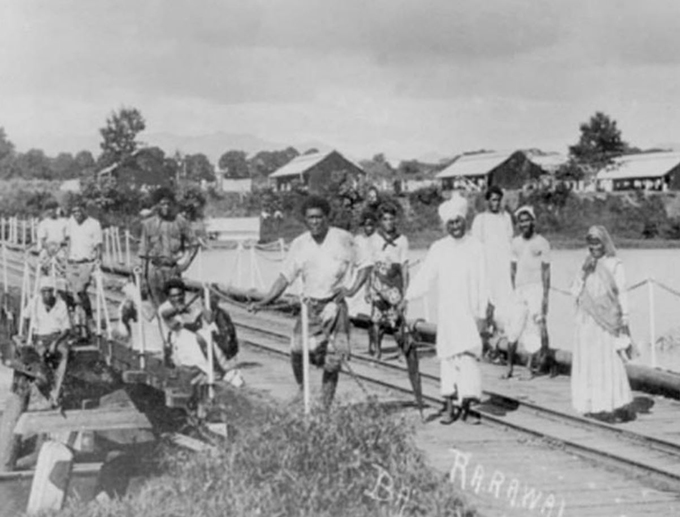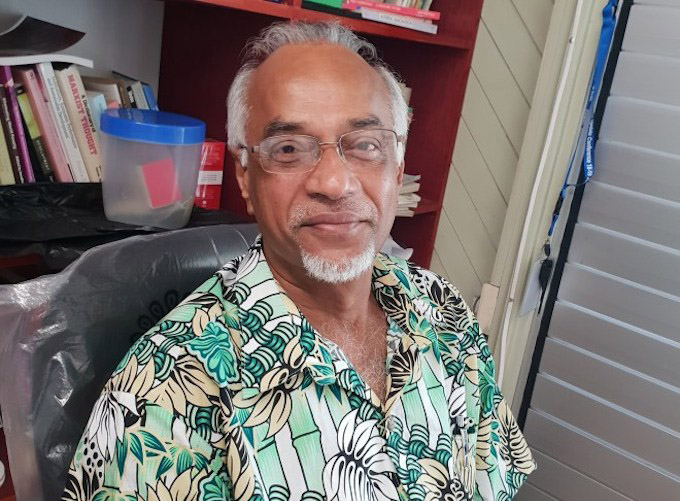
By Sri Krishnamurthi
“No matter how we come to be in Fiji, or how long we have been here …we all part of the land. It is the land of our birth or land of our adoption, the land to which we belong” – The late archbishop Petero Mataca.
When a New Zealand youth, an eighth generation Indo-Fijian, recently spoke out against education policies that exclude some Pacific Island people from Pasifika programmes and scholarships as unfair, he did not realise he was opening a thorny debate that goes back to 1879.
That was the year Indian indentured labourers were introduced to the Pacific with the first forebearers being brought aboard the Leonidas and their descendants have become part of the diaspora, or in the case of Aotearoa New Zealand become part of the double diaspora.
- READ MORE: 141st anniversary of the Girmityas arriving in Fiji
- Fiji Day – birth of a magazine and reflections of the past 50 years
Between 1879 and 1916, 87 voyages were made by 40 ships by the British bringing in the Girmityas or the people of the ”Agreement”.
As the venerable Professor Vijay Naidu of the University of the South Pacific in Suva attests to that: “Indo-Fijians or Fiji Indians or Fijians of Indian descent are descendants of the 60,500 British Indian indentured labourers who were transported between 1879 and 1916 to establish and work on the plantations of sugar, coconut, banana, tea, and rubber and sugar mills owned the Australian Colonial Sugar Refining Company”.
As he says these Girmityas lived in “lines” comprising of single rooms and worked in atrocious conditions in which has been called a new system of slavery, and “narak” or hell.
“In Fiji their roots lay in cultivating the land as small holder tenant farmers in mainly indigenous Fijian owned land. There has been more than a century of this relationship with i’Taukei, mostly cooperative and beneficial, and occasionally conflictual,” as Professor Naidu points out.
Reinforcing their culture
Through the 100 years and more they managed to reinforce their culture and religions while doing away with the caste system and gone too were dhowry for marriages.
Indo-Fijians have migrated to other countries such as Aotearoa NZ, Australia, Canada, United Kingdom and the United States all for a better life.
However, so too have the indigenous i’Taukei, all in search of new opportunities using both military service and rugby as a means to settle abroad.
But it is the better of two pursuits that makes for a good Fijian – i’Taukei or Indo-Fijian.
As children’s book author Ryan Gounder believes, all young people need role models to look up to.
Gounder, who was born and raised in Fiji and now lives in Aotearoa NZ, is writing a new series, starting with Rugby Superheroes Volume One, published in Fijian with English translations this year.
In Fiji, rugby players are like superheroes for many children and the lessons they teach us can strongly impact children in the community, Gounder says.
Developing ‘tangible resources’
“We need to develop more tangible resources for our young Pacific people that resonates with their identity as Pasifika people, and which will empower them and help develop resilience to be the ‘best versions of themselves’ – a famous phrase often using within the Rugby Sevens circles in Fiji,” says Gounder, whose first name resonates with Ben Ryan, the coach of the winning Rugby sevens team in Brazil in 2016.
The irony of Ryan Gounder is that he is a recipient aof the Languages Innovation Fund set up by the Ministry of Pacific People, despite being an Indo-Fijian. I will come back to that later in this article.
However, the i’Taukei, in the process of seeking better opportunities for their children and themselves too have lost their identity as they pursue the dollar.
While language remains one of the strongest senses of identity, so to are culture and religion that makes a person know where his or her Turangewaewae (standing place) is.
“In the Fijian community, it is often discussed at our annual gatherings how language is being lost,” Gounder says of the more serious discussion around the kava bowl.
It is not just the loss of language but traditional culture that displaces the I’Taukei and the Indo-Fijian, who has had to adopt new ways to cope with being in a new environment.
While the proponent of the coups in Fiji in 1987, which caused thousands of Indo-Fijians to emigrate, making them a minority in Fiji once more, Sitiveni Rabuka tried to reconcile with a democratic constitution review with joint sponsorship of the bill with Opposition Leader Jai Ram Reddy in 1997.
Constitution ‘unfortunately unilaterally revoked’
“It was unfortunate that the 1997 constitution was unilaterally revoked in July 2009 by the [Voreqe] Bainimarama-led military regime,” Rabuka wrote in a column in The Fiji Times in the lead up to the 2018 election.
“For me personally I have three reservations about the adoption of the 2013 constitution of “Fijian” as our common name.
“Firstly, the people were never consulted. It was imposed just like the Bainimarama regime’s repudiation of the 1997 constitution and the abolition of the Great Council Chiefs (GGC) – the Bose Levu Vakaturaga – in 2012.”
His second reservation was the allowing of dual nationality which he said diluted patriotism even if it paved the way for the reversing of the brain drain which took place after his 1987 coups.
The third reservation was most concerning for him was that which ignored the group rights of the indigenous I’Taukei and Rotuman people.
To him it was unacceptable that the 2013 constitution presumed there was no differentiation between the people.
“For an indigenous i’Taukei to be called a Fijian means more than being a Fijian citizen. It means being registered in the i’Taukei Vola ni Kawa Bula (VKB) as a member of a customary landowning Mataqali. (Traditionally, each Fijian villager is born into a certain role in the family unit or Tokatoka. Various heads of the family will administer and lead the family unit within the village community. Each chief of the village will in turn lead the people to fulfill their role to the Vanua.)
Mataqali and land rights
Each village will have several family units/Tokatoka which are part of one clan or Mataqali. Several Mataqali will make up the larger tribe or Yavusa. Several Yavusa will belong to a certain land mass and comprise thereby the Vanua (confederation of Yavusa)..
Fiji social scientist Dr Asesela Ravuvu described the Vanua as:”The living soul or human manifestation of the physical environment which the members have since claimed to belong to them and to which they also belong. The land is the physical or geographical entity of the people, upon which their survival…as a group depends. Land is thus an extension of the self. Likewise, the people are an extension of the land. Land becomes lifeless and useless without the people, and likewise the people are helpless and insecure without land to thrive upon.”
Therein lies the dilemma for the I’Taukei who no longer recognises the Mataqali he or she belongs to in Aotearoa NZ, having been away from the family clan.
With that comes the loss of identity and a reversion and accession to the Western World and hence that brings its own problems.
As Niuean Dr Collin Tukuitonga, who left Fiji after the 1987 coup, assesses: “People feel disconnected from their social norms and traditional values, family connections are disturbed and of course that is almost an inevitable consequence that young people in particular would turn to drugs and crime. That is why I see languages as a protective element for our people.”
The impacts of the loss identity can be devastating, but HOPE party leader Roko Tupou Draunidalo, stepdaughter of the 1987 Prime Minister Timoci Bavadra, has a different take on the subject.
“I am otherwise of the view that every Fijian born in Fiji or anywhere in the Pacific or with Fijian ancestry that lived in the Pacific with Pacific cultures and interactions is Fijian and therefore a Pacific Islander,” she says with conviction.
Culture alive and well
“I’Taukei have not lost their culture, it is alive and well and you need to go any village or I’Taukei home to realise that.”
However, that is not case in Aotearoa NZ. That Ryan Gounder was recognised for his work by the Ministry of Pacific Peoples despite being Indo-Fijian is a rarity rather than the norm.
The Search for the Indo-Fijian identity will require an act of Parliament so that they are differentiated from Southeast Asian Indians.
Currently they have to tick the Indian box in the census and are not recognised by some universities as Pasifika Peoples.

As Professor Vijay Naidu explains: “In response to a letter from Lorraine Pillay in early 2000 which inquired whether Indo-Fijians were ‘Pasifika’, the then PM Helen Clark’s office responded strongly in the affirmative.”
Pillay raised this identity question when she was told in a Wellington workshop for senior teachers and principals of secondary schools that Indo-Fijians were not eligible for scholarships as they were not considered to be “Pasifika”.
In sharp contrast to this standpoint, when I joined Victoria University of Wellington, Pasifika staff and students, and the wider community welcomed me as a “Pasifika” person.
As Professor Brij Lal has stated, generations of living in Fiji have changed our identity and outlook. We are indeed children of the ‘Pacific’!”
This article was first published in Fiji Dynamics, the new magazine for the Fiji diaspora in Aotearoa New Zealand, and has been republished with permission.














































Why is the author referring to Indigenous Itaukei and not use Indigenous Fijians?
Comments are closed.